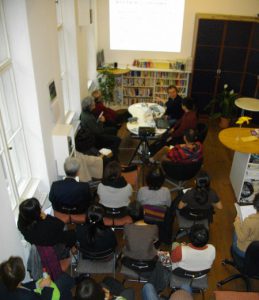[:ja]
なぜ最終処分の話なのでしょうか
前回の勉強会,「廃炉の話をしようや 」で廃炉の後には放射性廃棄物が残ることがわかりました.しかし,その勉強会では私達はこの廃棄物をどうするのかという話については伺いませんでした.事故,あるいは寿命の尽きた原子炉をどうするのかというのが廃炉の話であり,廃炉には費用(一例: 1基1000億円)と時間(一例: 30年)がかかりますが,その後にまだ核のゴミが残る,というところで前回の勉強会は終わりました.こうなるとその核のゴミをどう処分するかという「最終処分」の話を聞きたくなります. 元々,SNB (Sayonara Nukes Berlin) のメンバーの一部からは両方の話を聞きたいという要望があったのですが,1回 2 時間半という枠で両方の話をするのは難しいということでした.そのためにまずは廃炉の話ということになりました.廃炉の勉強会の後,結局最終処分についても伺いたいという要望があり,今回の最終処分についての勉強会となりました.今回も前回に引き続き,ふくもとさんを講師としてお迎えしての勉強会になりました.以下の写真(図 1)が今回の様子です.(この勉強会は 2014年の11月15日に行なわれました.)
 図 1.「最終処分の話をしようや」勉強会の様子 (2014-11-15)
図 1.「最終処分の話をしようや」勉強会の様子 (2014-11-15)
前回と同じく,このメモはその勉強会での記録を記録者の私が理解したようにまとめたものです.この記録は廃炉の話がわかっているとよりわかりやすいと思います.それは前回の記録をご覧下さい.また,講師のふくもとさんについての紹介なども前回の記録を御参照下さい. また,この記録はふくもとさんの説明やご意見を聞き,それについてこの記録者のやまうちが感想を述べたり,独自に調べた部分があります.記録者の考えの部分は,「やまうちメモ」のタイトルがついて別の節になっています.それは記録者のやまうちの感想であってふくもとさんの意見ではないことにご注意してお読み頂ければと思います.またこの文書の文責は記録者のやまうちにあります.
はじめに
前回,ふくもとさんはエネルギー問題について,「市民としてできることを考える」ことの重要さについて述べました.それについては前回の記録にもありますが,1つ補足しておきたいことを述べられました.それは次のようなものです.
福島原発事故の後に停電して,それが原発が止まっているからだと電力会社にいわれたら,その時それでも原発に反対できますか.そういうことを一度考えてほしい.
まずは考えて意見を持つことの重要さについて述べられていました.そのために情報を探し自分で理解することが重要であり,その結果,原発について反対するのもよし,賛成するのもよし,どちらにせよできるだけ正しい情報に基いて個々が考えて議論をするべきであるということです.
やまうちメモ
これは最初のやまうちメモです.最初に述べたように,やまうちメモは報告者のやまうちが勉強会に触発されて後で調べたことや,やまうちの個人的な感想,意見を書くところです. 私達が現状をどう考えるか,私達の未来をどう考えるのか,それは結局選挙で見られる民意によるものです.私もこの話を伺って考えました. 私の考えたことは,たとえば,原発のある未来が私の欲しい未来なのだろうかどうか.そして,電気が足りていないと言われたから原発に賛成し,足りているとわかったら反対,というものでいいのだろうか? でした.そこにはまず未来へのビジョンがあるべきです.現状との妥協はあるとしても,一人一人にできることを考えていくことをしなくては,未来に進んでいくのはできないのではないかということでした.来年やさらなる未来だけではなく,明日のことも大事です.しかし未来は明日の積み重ねです.未来を見て明日を妥協するのか,明日がなければ未来はないのだから,明日だけをまず考えるべきという考えもあるでしょう.難しい問題だと思いますが,時には立ち止まる必要があると私は思います.なぜなら私達,そして私達の子孫はその未来を生きることになるはずからです.これは私個人の意見ですが,今が良ければ,私達や,私達の子達の未来はどうでも良いという考えには私は賛成できません. 技術的には様々な可能性があります.電気を使わないというような極端な考えはなかなか受け入れにくいものかもしれません.しかし,自然エネルギーと水素生成の組み合せで,太陽光のように時間に依存するエネルギーも安定供給源となるような方法が可能かもしれません.しかもコストも含めた方法が技術開発によって将来可能になるかもしれません.その道を開くことも未来を考える1つの方法でしょう.それのような技術を将来海外へと輸出して国益とするということも考えに入れても良いかもしれません. 政治的にも様々な可能性があります.ドイツのように原発の電気は買いたくない人にはその道を,同様に原発の電気だけを買いたい人にもそうする道を開くのも1つです.どちらの考えであっても消費者の欲しいものが提供されていないことは問題で,これは選挙を含めた様々な方法によって市民から働きかけることができるものです. 結局,賛成派であっても反対派であっても自分で現状を判断して自分の未来についての自分の意見を考える必要があると思います.そのためにも地道,つまり退屈なことになりがちと思いますが,私も少しづつ現状を理解して考えていきたいと思います.この記録が少しでもその考える際の参考になることを願います.
次回
次回は最終処分とはどういうものか,放射性廃棄物とは何なのかについて考えていきたいと思います.[:en]In our last meeting “Let’s talk about nuclear decommissioning,” we realized the nuclear decommissioning produces nuclear waste. But we did not talk about what do we do about the nuclear waste. A nuclear decommissioning is about what do we do for a reactor after its lifespan ended or cannot use the reactor anymore when it is broken by any reason (e.g., an accident). What we learned was that a decommissioning costs money (e.g., 1 billion dollar/reactor) and time (e.g., 30 years). Even then the decommissioning has finished, the nuclear waste still remains. The last meeting ended here. Then some of our members asked: “What do we do about the nuclear waste?” “How much does they cost?” “Who need to pay that?” “What is the current plan?”
The members of SNB (Sayonara Nukes Berlin) originally asked both questions: nuclear decommissioning and nuclear waste management. However, two and half hours were not enough to talk about both themes. So, we have this second meeting.

There are two parts alternately in this report: Fukumoto’s lecture and Yamauchi’s memorandum. Yamauchi’s memorandum is the part of how the reporter understood.
Introduction
In the first meeting, Fukumoto pointed out the importance of “think through what I can do as a citizen,” when anyone thinks about the energy problem. He would like to add one more point in this meeting:
After the Fukushima incident, we had blackout days. When the power companies explained that this is because we do not have nuclear reactors running. Can you still be against the nuclear reactor? Please think through this once more.
He mentioned the importance of thinking about the problem first and having an opinion. It is important to understand the problem yourself and also important to find the information by yourself. It does not matter whether you are in favor of the reactor or against the reactor. But you need to find the correct information and you need to think about the problem based on that information.
Yamauchi’s memorandum
The sections of Yamauchi’s memorandum shows the reporter’s opinion and research; how we think in the current situation, how we think about our future. Under our current political system, these ideas will be shown in the vote. After the meeting, I reconsider this.
What I thought was that: Do I want to have a future with nuclear reactors? Do I agree with the nuclear reactors because the electric company said they are needed. Do I disagree with the nuclear reactors if the electricity is enough? I thought first I needed a clear vision for our future. The vision should not depend on whether the current electricity is enough or not. The reality would have some compromises, but the vision should not. I would like to think about what I could do, or what each of us could do for our future. Of course this also includes the near future, tomorrow. Shall I make a compromise tomorrow? Another idea is that there is no future without tomorrow. So we could put the highest priority on tomorrow. It is not a simple problem. Still I think I should have a clear vision for the future. Because we and our children will live in that future. In my personal opinion, I could not agree with the idea that now is important enough, so that we can destroy the future.
We see a lot of potential in our technology. I understand that we cannot stop using electricity now. However, we have some technology that generates sustainable energy. For example, a combination of solar energy and hydrogen energy, we might have a stable energy source. We could develop a technology to produce this energy at low cost in the future. Investing in such technology is also a way of working on the future. One day we could export such technology to the people who need all over the world.
We also have a lot of possibility in politics. We can provide a way to only buy natural energy for the people who want this. This means we can also provide a way to only sell nuclear energy to the people who want it. I see that the current problem in Japan is that the people cannot choose in either way. (There is an official plan to make this possible.) We can work on these political problems together.
In the end, I need to have my own opinion based on the current situation. It will be cumbersome, it will be hard, but I need to understand the current situation. I hope this report is of use to someone who would like to understand the current situation.
We tend to avoid the politics, we can leave it alone. But politics will catch you. — Richard Stallman.
[:]
